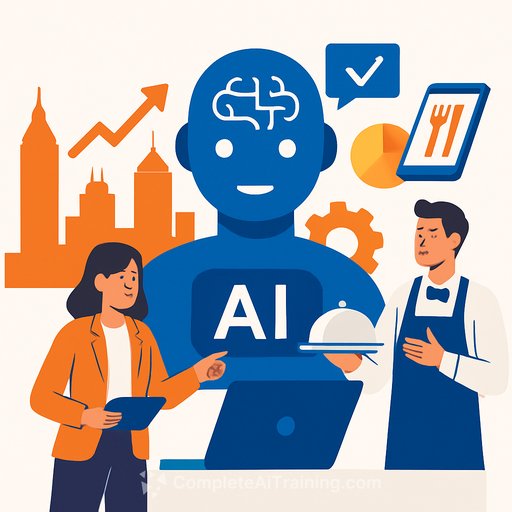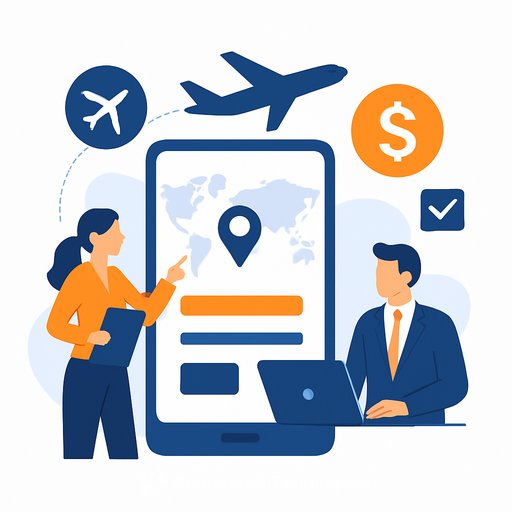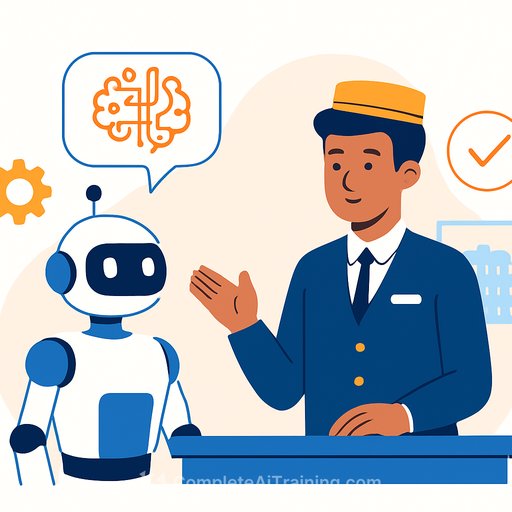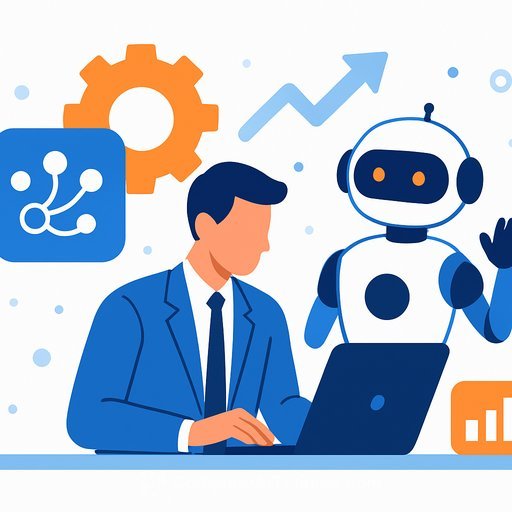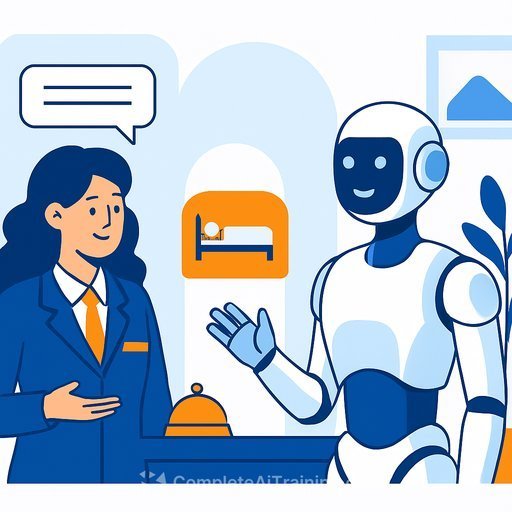The Complete Guide to Using AI in the Hospitality Industry in Atlanta in 2025
Too Long; Didn't Read:
In 2025, Atlanta's hospitality sector is adopting AI at scale, with 73% of hoteliers using AI for personalized guest services, contactless check-ins, and smarter revenue management. AI tools have boosted revenue by 17%, occupancy by 10%, and guest inquiry handling by 80%, improving both efficiency and guest satisfaction.
The AI Trend in Hospitality Technology in Atlanta in 2025
Atlanta’s hospitality businesses are shifting their approach to embrace AI technologies that optimize operations and improve guest experiences. AI-driven marketing automates routine tasks and delivers personalized content, while chatbots and virtual assistants handle up to 40% of customer support, freeing staff for higher-value interactions.
Hotels rely on analytics platforms to forecast occupancy, set dynamic pricing, and allocate resources efficiently using real-time data. Contactless services like biometric check-ins and digital wallets are becoming standard, offering seamless guest experiences.
Compliance with data privacy laws is critical as digital interactions increase. Starting with small AI projects and scaling quickly while maintaining human oversight helps ensure quality and reliability. Importantly, AI enables small and medium-sized businesses (SMBs) to compete effectively by improving lead generation, customer segmentation, and personalized engagement.
Key AI Use Cases Transforming Hospitality Operations in Atlanta
AI is changing hospitality operations by enhancing personalization and efficiency. For example, AI virtual concierges like Marriott’s RENAI tailor services such as room settings and local recommendations based on guest data.
Automation through AI supports contactless check-ins, optimizes housekeeping using IoT sensors, and forecasts inventory to reduce waste. Dynamic pricing systems analyze multiple factors including local events and competitor rates, resulting in a 17% revenue increase and a 10% rise in occupancy.
AI chatbots and voice assistants manage up to 80% of guest inquiries around the clock, reducing front desk workload and increasing upsell opportunities. Energy management and food waste reduction powered by AI also help hotels meet sustainability goals.
The Future of AI in the Hospitality Industry in Atlanta, Georgia
Seventy-three percent of hoteliers in Atlanta believe AI will significantly transform hospitality. With 168 hotel projects underway, the city is a hotspot for innovation.
AI advances will drive hyper-personalized guest experiences, dynamic pricing, and automation that cut costs and optimize resources. Sustainable practices supported by AI, such as energy management, align with growing traveler preferences.
AI-driven communication tools improve responsiveness without replacing human interaction. The integration of AI is becoming essential for hotels to remain competitive and meet modern guest expectations.
AI Legislation and Compliance Impacting Atlanta Hospitality Businesses in 2025
The European Union’s Artificial Intelligence Act (effective August 2, 2025) affects Atlanta hospitality businesses processing EU citizens' data or serving European guests. The Act classifies AI systems by risk and requires transparency, human oversight, documentation, and AI literacy training.
Non-compliance carries fines up to 6% of global turnover. While enforcement grace periods extend into 2026–2027, early preparation is crucial. U.S. state laws are adopting similar principles, emphasizing responsible AI use.
Hospitality providers should conduct AI audits, ensure user transparency, appoint AI governance officers, and consult legal experts to align with both EU and local data privacy regulations.
Top AI Hotel Management Systems Being Adopted in Atlanta in 2025
Atlanta hotels are selecting AI hotel management systems that boost guest engagement and streamline operations. Platforms like Duve offer AI-driven personalized communication, while RoomMaster Concierge provides 24/7 multilingual support and upsell management.
Cloudbeds uses generative AI to automate marketing, reputation management, and guest messaging. These systems integrate seamlessly with existing property management software and scale to fit different business sizes.
Marketing with AI: Enhancing Guest Engagement for Atlanta's Hospitality SMBs
Small and medium-sized hospitality businesses leverage AI marketing tools to target audiences, build buyer personas, and automate content creation across social media, email, and websites. Local agencies such as LYFE Marketing and M16 Marketing utilize AI for SEO, advertising, and data analytics.
Tools like ChatGPT and Robotic Marketer enable small teams to automate diverse marketing tasks, improving efficiency and guest engagement. AI dashboards help monitor campaigns and enhance customer relationships, empowering SMBs to compete with larger brands while respecting data privacy.
Academic and Research Resources Supporting AI in Atlanta's Hospitality Sector
Georgia State University’s J. Mack Robinson College of Business offers graduate programs and certificates focused on AI and data-driven business applications. The upcoming Master of Interdisciplinary Studies in Data Science and Accounting blends technical accounting skills with AI analytics.
The Artificial Intelligence Business Innovation Graduate Certificate and the Master of Global Hospitality Management emphasize AI-driven decision-making and customer management. Flexible options are available both online and in-person, supporting professionals seeking to build AI skills relevant to hospitality.
Challenges and Solutions for AI Adoption in Atlanta's Hospitality Industry
Labor shortages and rising costs push Atlanta’s hospitality businesses to consider AI automation for reservations, order-taking, and marketing. Maintaining data quality and privacy is vital to avoid generic outputs and protect guest trust.
Guests still expect human interaction, especially in frontline roles, so balancing automation with personal service is key. Budget constraints make cost-effective AI solutions attractive. Successful adoption involves investing in complementary AI tools, upskilling staff, and transparent communication about AI’s role.
Conclusion: The Outlook for AI in Atlanta's Hospitality Industry in 2025 and Beyond
AI is reshaping hospitality operations and guest experiences in Atlanta. Its strategic use improves revenue, operational efficiency, and personalization while addressing privacy and ethical concerns.
Automation frees staff to focus on meaningful interactions, leading to higher guest satisfaction. AI-driven CRM and predictive analytics enable real-time, personalized marketing and services.
Challenges remain in preserving the human touch and complying with regulations. Building comprehensive AI ecosystems with governance frameworks is essential. For professionals eager to gain AI skills, accessible training programs offer practical paths to adoption and innovation.
Frequently Asked Questions
- How is AI transforming the hospitality industry in Atlanta in 2025?
AI enables hyper-personalized guest services, automates routine tasks like check-ins and housekeeping, optimizes pricing dynamically, and uses chatbots to handle up to 80% of inquiries. These improvements increase revenue by up to 17% and occupancy by 10% while supporting sustainable operations. - What AI compliance and legislation should Atlanta hospitality businesses be aware of in 2025?
The EU’s Artificial Intelligence Act requires transparency, human oversight, documentation, and AI literacy training for high-risk AI systems. Non-compliance can result in heavy fines. Regional data privacy laws and state regulations also affect AI governance, making legal counsel and compliance essential. - How are small and medium-sized hospitality businesses in Atlanta leveraging AI marketing tools?
SMBs use AI to define target markets, create buyer personas, and automate content creation across multiple channels. Local agencies apply AI for SEO and advertising optimization, helping SMBs improve engagement and compete effectively while ensuring data privacy compliance. - What educational resources are available in Atlanta for hospitality professionals to build AI expertise?
Georgia State University offers AI-focused graduate certificates and degrees combining AI, data analytics, and hospitality management. These programs provide practical, ethical AI training accessible to professionals without technical backgrounds. - What challenges do Atlanta hospitality businesses face when adopting AI, and how can they be addressed?
Challenges include labor shortages, data privacy, balancing automation with personalized service, and budget limits. Solutions involve strategic AI investments complementing staff, employee upskilling, strong governance, and transparent communication to maintain guest trust and operational efficiency.
Your membership also unlocks:

